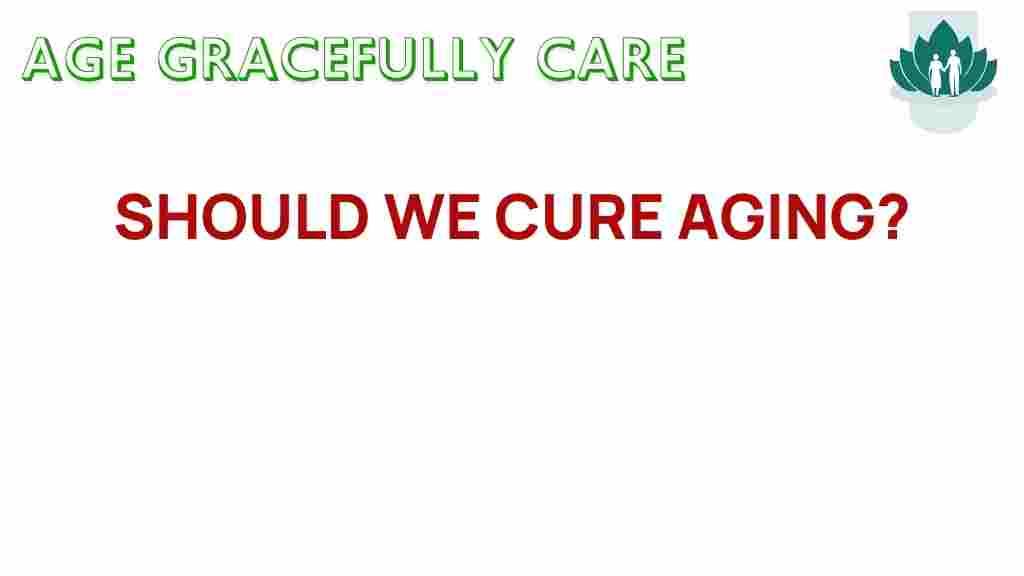The Quest for Immortality: Should We Cure Aging?
The quest for immortality has captivated humanity for centuries. From ancient myths of eternal youth to modern scientific endeavors aimed at curing aging, the desire to extend life and enhance well-being is ever-present. Today, advancements in biotechnology and genetics have opened new avenues in the fight against aging. But with these possibilities come profound ethical dilemmas that we must consider. This article explores the implications of curing aging, the quest for longevity, and the potential impact on health, life expectancy, and overall wellness.
Understanding Aging
Aging is a complex biological process marked by a gradual decline in physiological functions. This process leads to increased susceptibility to diseases and ultimately results in death. Here are some key concepts related to aging:
- Biological Aging: Refers to the physical and functional changes that occur over time.
- Chronological Aging: The actual time that has passed since birth.
- Cellular Aging: The deterioration of cellular function, which contributes to the aging process.
As we age, our bodies undergo various changes, including:
- Decreased muscle mass and strength
- Declining bone density
- Reduced cardiovascular function
- Impaired cognitive abilities
The Science Behind Curing Aging
With the advancement of biotechnology and genetics, researchers are exploring ways to combat aging. Here are some promising areas of research:
- Telomere Extension: Telomeres protect the ends of chromosomes and shorten with each cell division. Scientists are investigating ways to extend telomeres to promote cell longevity.
- Stem Cell Therapy: This involves using stem cells to regenerate damaged tissues and organs, potentially reversing some effects of aging.
- Gene Editing: Technologies like CRISPR allow for precise modifications to DNA, which could correct genetic issues that contribute to aging.
- Caloric Restriction Mimetics: Compounds that mimic the effects of caloric restriction have shown promise in extending lifespan in various organisms.
The Potential Benefits of Curing Aging
Enhancing our understanding of aging could lead to significant benefits, including:
- Increased Life Expectancy: Advances in medicine could lead to longer, healthier lives.
- Improved Quality of Life: Curing aging could reduce age-related diseases, allowing individuals to maintain their independence longer.
- Economic Benefits: A healthier aging population could reduce healthcare costs and increase productivity.
- Enhanced Wellness: Greater focus on health and well-being could improve mental and physical health across populations.
Ethical Dilemmas Surrounding Immortality
While the science of curing aging offers exciting possibilities, it is not without its ethical dilemmas. Here are some key considerations:
- Access and Inequality: If life-extending treatments are costly, they may only be available to the wealthy, exacerbating social inequalities.
- Overpopulation: If people live significantly longer, the strain on resources could lead to overpopulation and environmental degradation.
- Quality vs. Quantity of Life: Extending life does not guarantee a high quality of life; ethical considerations must address the potential for prolonged suffering.
- The Meaning of Life: Philosophers question what it means to live a fulfilling life if immortality becomes a reality.
Step-by-Step Process: How to Approach Longevity and Wellness
To harness the advances in biotechnology and genetics for better aging outcomes, individuals can take a proactive approach. Here’s a step-by-step process:
Step 1: Adopt a Healthy Lifestyle
Focus on nutrition, exercise, and mental health. Incorporate the following into your daily routine:
- Balanced diet rich in antioxidants
- Regular physical activity
- Mindfulness and stress management techniques
Step 2: Stay Informed About Scientific Advancements
Keep up with the latest research in biotechnology and genetics through reputable sources. Websites like National Institute on Aging provide valuable information.
Step 3: Consider Preventative Healthcare
Regular check-ups and screenings can help detect health issues early. Discuss with your healthcare provider about:
- Genetic testing for predispositions to age-related diseases
- Availability of supplements that may promote longevity
Step 4: Engage in Community and Support Networks
Social connections play a crucial role in mental and emotional health. Join communities focused on wellness and aging.
Troubleshooting Tips for Longevity and Aging Concerns
As you strive for a longer, healthier life, you may encounter challenges. Here are some troubleshooting tips:
- Challenge: Difficulty maintaining a healthy diet.
- Solution: Plan meals ahead, and consider meal prep services that focus on healthy options.
- Challenge: Lack of motivation to exercise.
- Solution: Find a workout buddy or join group classes to make it more enjoyable.
- Challenge: Managing stress effectively.
- Solution: Incorporate relaxation techniques like yoga or meditation into your routine.
Conclusion: The Future of Aging and Immortality
The quest for immortality and the cure for aging presents a fascinating intersection of science, ethics, and personal choice. As advancements in biotechnology and genetics continue to progress, society must grapple with the implications of these technologies on life expectancy and wellness.
Ultimately, the decision to pursue cures for aging will depend on a balance between the potential benefits and the ethical considerations involved. As we stand on the brink of a new era in human history, we must carefully navigate these waters, ensuring that our quest for immortality enhances the quality of life for all.
By staying informed and proactive about health and wellness, individuals can contribute to a future where aging is not merely endured but embraced with vitality and purpose. For more insights on aging and longevity, explore [this resource](#) that discusses the role of genetics in health outcomes.
This article is in the category Health and created by AgeGracefullyCare Team
